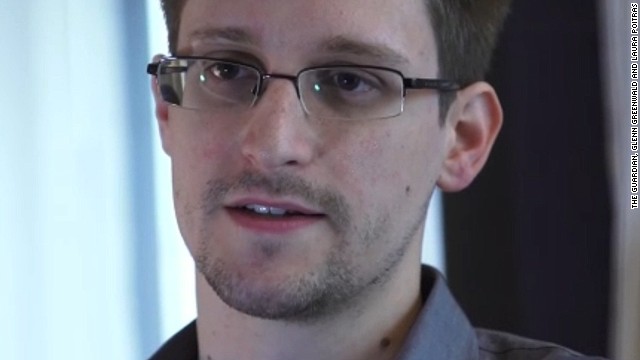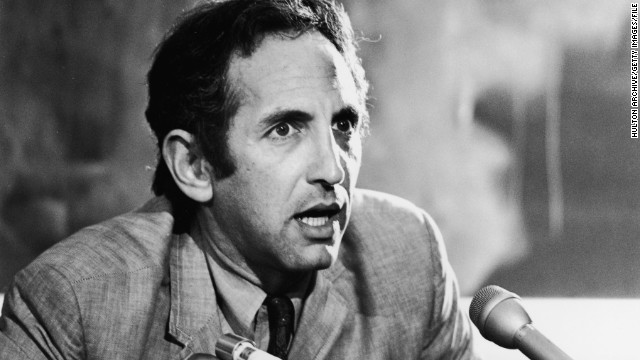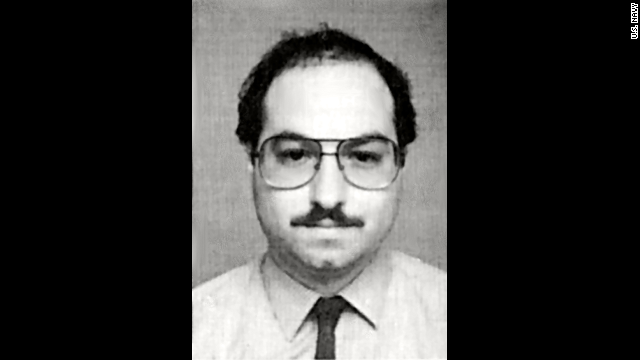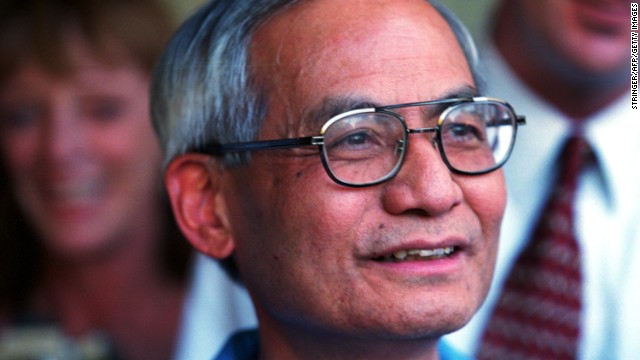
Some did it for the money, some did it for idealism, others didn't do it at all. The United States has seen a number of high-profile leak scandals in the years, most recently involving former intelligence contractor Edward Snowden, who revealed himself as the leaker of details of U.S. government surveillance programs run by the U.S. National Security Agency to track cell phone calls and monitor the e-mail and Internet traffic of virtually all Americans. Snowden has been granted temporary asylum in Russia after initially fleeing to Hong Kong. He has been charged with three felony counts, including violations of the U.S. Espionage Act, over the leaks.
 Military analyst Daniel Ellsberg
leaked the 7,000-page Pentagon Papers in 1971. The top-secret documents
revealed that senior American leaders, including three presidents, knew
the Vietnam War was an unwinnable, tragic quagmire. Further, they
showed that the government had lied to Congress and the public about the
progress of the war. Ellsberg surrendered to authorities and was
charged as a spy. During his trial, the court learned that President
Richard Nixon's administration had embarked on a campaign to discredit
Ellsberg, illegally wiretapping him and breaking into his psychiatrist's
office. All charges against him were dropped. Since then he has lived a
relatively quiet life as a respected author and lecturer.
Military analyst Daniel Ellsberg
leaked the 7,000-page Pentagon Papers in 1971. The top-secret documents
revealed that senior American leaders, including three presidents, knew
the Vietnam War was an unwinnable, tragic quagmire. Further, they
showed that the government had lied to Congress and the public about the
progress of the war. Ellsberg surrendered to authorities and was
charged as a spy. During his trial, the court learned that President
Richard Nixon's administration had embarked on a campaign to discredit
Ellsberg, illegally wiretapping him and breaking into his psychiatrist's
office. All charges against him were dropped. Since then he has lived a
relatively quiet life as a respected author and lecturer.
Jonathan Pollard is a divisive figure in U.S.-Israel relations. The former U.S. Navy intelligence analyst was caught spying for Israel in 1985 and was sentenced in 1987 to life imprisonment. Israeli Prime Minister Benjamin Netanyahu has publicly called for President Barack Obama to release Pollard after Pollard's wife appealed to Netanyahu.
 Wen Ho Lee was a
scientist at the Los Alamos Laboratory in New Mexico who was charged
with 59 counts of downloading classified information onto computer tapes
and passing it to China. Lee eventually agreed to plead guilty to a
since count of mishandling classified information after prosecutors
deemed their case to be too weak. He was released after nine months in
solitary confinement. Lee later received a $1.6 million in separate
settlements with the government and five news agencies after he sued
them, accusing the government of leaking damaging information about him
to the media.
Wen Ho Lee was a
scientist at the Los Alamos Laboratory in New Mexico who was charged
with 59 counts of downloading classified information onto computer tapes
and passing it to China. Lee eventually agreed to plead guilty to a
since count of mishandling classified information after prosecutors
deemed their case to be too weak. He was released after nine months in
solitary confinement. Lee later received a $1.6 million in separate
settlements with the government and five news agencies after he sued
them, accusing the government of leaking damaging information about him
to the media.The scandal over allegations about NSA surveillance overseas, including monitoring of the cell phone conversations of German Chancellor Angela Merkel and millions of phone calls in France, is another huge blow to President Barack Obama.
The news has caused a big
uproar in Western Europe, with Merkel demanding a response from
Washington. It was "incredible that an allied country like the United
States and at this point goes as far as spying on private communications
that have no strategic justification," said Jean-Marc Ayrault, the
Prime Minister of France. "Trust needs to be rebuilt," Merkel said.
While observers warn
these complaints are hypocritical and have more to do with domestic
politics in Western Europe than true feelings about the United States,
this incident is nonetheless much more than a mere blip in the time line
of Obama's presidency. The recent National Security Agency revelation
is one more step in a series of revelations about practices that have
undercut a central promise that candidate Obama made in 2008 -- to
repair America's standing in the world.
When Obama took office,
America's position in the global community had greatly deteriorated.
President George W. Bush's war in Iraq, and his unilateral approach to
foreign policy, had generated tremendous distrust and anger overseas,
including among our closest allies.
So, too, had Bush's
apparent disregard for civil liberties and willingness to ignore
international standards against the use of torture. The United States
was seen as a country that acted solely in its own interest and that
cared little for protecting strong and durable multilateral alliances.
The United States, in the minds of its critics, also took reckless
actions to defend its national security interests without thinking about
the consequences.
Obama was determined to
correct this. This had been a constant theme of his campaign against
presidential opponent Sen. John McCain, more so than almost any domestic
issue. In June 2008, speaking in Germany near the place where the
Berlin Wall once stood, Obama said that, "In Europe, the view that
America is part of what has gone wrong in the world rather than a force
to help make it right has become all too common."
He continued to expound
on this theme in his first year as president. His stirring speech in
Cairo in June 2009 offered inspirational words to many of his
supporters, evidence that the president was serious about fixing the
damage that had occurred under Bush.
But the promise is
unfulfilled. Over the years, it has become clear that Obama left much
more of Bush's foreign policy framework in place than many of his
supporters had expected.
He continued with an
extremely aggressive campaign against terrorist networks, employing
drone strikes to destroy networks even when there have been significant
civilian causalities, allowing for tough interrogation techniques and
detention policies and depending on secret processes that created little
accountability for what the government was doing, other than when
leakers revealed classified information. Inconsistent policies toward
authoritarian Middle Eastern regimes in countries such as Syria, as well
as turbulence in Egypt following the fall of Hosni Mubarak, have
greatly dampened the enthusiasm about Obama that had existed after 2008.
Nor did Obama do much to
strengthen civil liberties. The public has begun to learn how extensive
the surveillance has been on their phones, on their computers and every
other type of communication that occurs. In short, the government has
been watching.
To be sure, the success
at generally preventing terrorist strikes within the U.S., barring
Boston, is a central accomplishment of his presidency. But the
difficulties he has faced achieving the balance he promised in relations
with the rest of the world have come with a cost.
The NSA issue began with
a debate about the proper domestic balance between civil liberties and
counterterrorism and has now has extended into the realm of diplomacy.
Obama needs to make this
right. The controversy hurts the ability of the United States to
maintain strong relations with the allies whose support is essential to
the war on terrorism, as well as in fighting against other global
threats. He must provide answers and show that the government is
responding to concerns about NSA practices.
One administration
official has told the Wall Street Journal that President Obama had been
unaware of NSA spying on 35 world leaders and that, as soon as he
learned of the practice through an internal review (a response to the
political outrage over the revelations of the spy program), he put parts of the program to an end.
Even if this is the case -- and the president will need to make clear
this is so given how cynical and skeptical the world has become about
U.S. political rhetoric on these matters -- the information begs the
question of how the NSA was allowed to remain so unaccountable even to
the Commander-in-Chief and, more importantly, what steps President Obama
will now take to make sure we conduct our counterterrorism programs
within some kinds of parameters and guidelines.
If Obama does nothing
further, the ongoing revelations will leave behind the same kinds of
problems that he, as a candidate, understood to be so devastating in
2008.
No comments:
Post a Comment